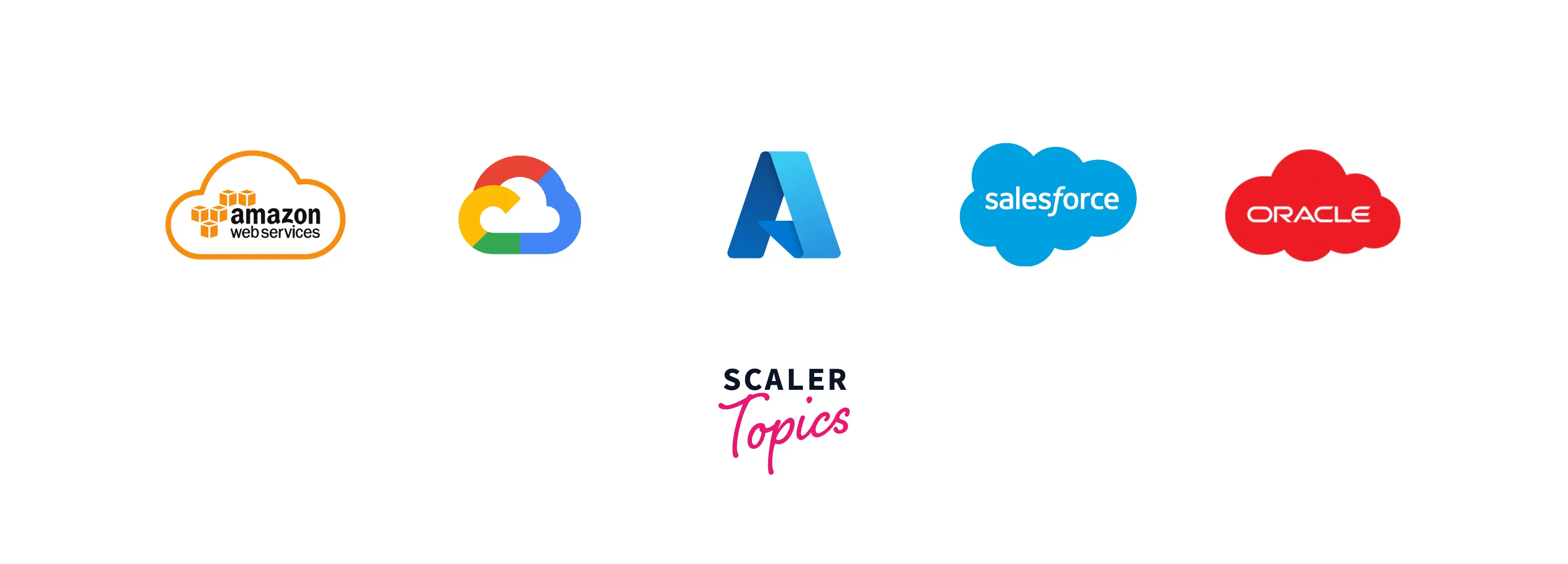Cloud Service Providers Selection
Overview
A business that provides cloud computing components is known as a cloud service provider (CSP). These components typically come in the form of the platform as a service, software as a service, or infrastructure as a service.
What Are Cloud Service Providers?
Cloud service providers offer cloud components for clients using their own data centres and computer resources. Various pay-as-you-go subscription models are frequently used to determine the cost of cloud services. Customers only pay for the resources they use, such as the time spent using a service, the storage space utilized, or the number of virtual machines used.
The most popular CSPs are Microsoft Azure, Google Cloud, and Amazon Web Services (AWS).
Why Use Cloud Service Providers?

You and your team are responsible for managing, updating, and changing each component when your software and hardware are all on-premises. Instead, you can delegate the management of some or all of the components of your infrastructure to a third party using cloud service providers.
Here are some key benefits of using cloud service providers:
- Cost and flexibility - Organizations may use the pay-as-you-go cloud service model to only pay for the resources they use.
- Scalability - Depending on business needs, clients may simply scale down or up the IT resources they use.
- Mobility - From any physical location with a functional network connection, customers may access the resources and services they have acquired from a cloud service provider.
- Disaster recovery - Disaster recovery is often swift and dependable using cloud computing services.
Challenges in Selection of Good Cloud Service Providers
We have seen the benefits of CSPs but there are also some challenges faced while choosing them. Let’s take a look at some of them:
- Hidden costs - The initial return on investment study may not have taken into account costs associated with cloud utilization. Businesses must account for the increased manpower requirements for managing and monitoring cloud usage in order to be cost-effective.
- Cloud migration - Data transfer to and from the cloud might be time-consuming. Large volumes of data must first be moved to the cloud, which might take weeks or even months. During this time, businesses might not have access to their crucial data.
- Cloud security - Organizations run the danger of security breaches, compromised credentials, and other significant security threats when they entrust their sensitive data to cloud service providers. Additionally, suppliers might not always be honest about their security policies and procedures.
- Vendor lock-in - It is challenging to change cloud service providers. Companies should have a cloud exit strategy in place before signing any contracts to prevent vendor lock-in.
List Of Cloud Service Providers And Offerings

Let’s take a look at some of the popular cloud service providers and what they offer.
- Amazon Web Services (AWS) - It is a safe cloud service platform that Amazon offers. To help the business expand, it provides a range of services such database storage, processing capacity, content distribution, Simple Queue, Simple Email, Relational Database, and other features.
- Microsoft Azure (Windows Azure) - It supports a wide range of operating systems, databases, programming languages, and frameworks that make it simple for IT professionals to create, distribute, and manage applications over a global network.
- Google Cloud Platform - It is a Google product. A number of physical components, including computers, hard drives, big data services, networking, and virtual machines, make up this system. Additionally, it aids enterprises in streamlining the transfer procedure.
Cloud Service Providers Selection
Here comes the crucial part. Here are the factors that organizations should consider while evaluating potential cloud service providers.
- Cost - The price is often based on a per-use utility model, but it is important to check all the subscription information and provider-specific variants.
- Tools and features - It's crucial to evaluate all of a provider's features, such as data management and security features, to make sure they satisfy both present and future requirements.
- Physical location of servers - For sensitive data that must adhere to data storage rules, the location of the server could be a crucial consideration.
- Security - Cloud service providers should prioritize cloud security above everything else.
Standard Cloud Features
Let's take a look at some features that your chosen cloud should have.
- Interoperability - Your cloud should be interoperable. It should be able to communicate with other cloud systems, in terms of messages and data. It should be able to exchange data with other clouds and be able to use the exchanged data as well.
- Portability - It should be simple to transmit data in a widely used electronic format to another cloud service or to a cloud service customer's system. It involves transferring information and/or programs from one system to another while keeping them functional or executable.
- Integration - The ability to authenticate and authorize access to resources both on-premises and in the cloud is a need for a cloud integration solution.
- Security - Cloud computing security is a serious problem. Cloud data should be kept in an encrypted format. The use of proxy and brokerage services should be implemented to prevent clients from directly accessing the shared data.
A cloud service should have cloud interoperability and portability to serve the below needs.
- Transferring data or applications from one cloud to another.
- Using multiple cloud services at the same time.
- Linking multiple clouds to work together.
- Linking public and private clouds to have a hybrid cloud configuration.
- Cloud migration.
Conclusion
- Cloud service providers are companies that provide cloud computing resources. They charge you for what you use.
- Flexibility, scalability and mobility might be the benefits of using cloud service providers although you should be alert about the hidden costs and security issues they come along with.
- One should keep various aspects such as the cost, features, security, portability and others in mind while selecting their cloud service provider.
